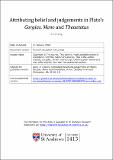Files in this item
Attributing belief and judgements in Plato’s Gorgias, Meno and Theaetetus
Item metadata
| dc.contributor.author | Long, Alex | |
| dc.date.accessioned | 2022-11-17T00:38:24Z | |
| dc.date.available | 2022-11-17T00:38:24Z | |
| dc.date.issued | 2020-11-17 | |
| dc.identifier | 265877965 | |
| dc.identifier | 43561a0f-f710-4275-8355-285addf6eb6d | |
| dc.identifier | 85113102404 | |
| dc.identifier.citation | Long , A 2020 , ' Attributing belief and judgements in Plato’s Gorgias , Meno and Theaetetus ' , Oxford Studies in Ancient Philosophy , vol. 58 , 3 , pp. 59-90 . https://doi.org/10.1093/oso/9780198858997.003.0003 | en |
| dc.identifier.issn | 0265-7651 | |
| dc.identifier.other | ORCID: /0000-0001-5838-5490/work/83889984 | |
| dc.identifier.uri | https://hdl.handle.net/10023/26417 | |
| dc.description | ISBN: 9780198858997 ISBN: 9780198859017 | en |
| dc.description.abstract | In Plato’s Theaetetus Socrates explains what it is to have a doxa, a judgement or belief. A doxa is a self-addressed affirmation or denial that comes into existence when, after giving a question thought, the subject settles on one answer. Two passages seem to conflict with this account of doxa. In the Gorgias a belief is attributed to Polus on the strength of what he is committed to by his other beliefs. But Socrates is trying to show complexity in an apparently universal consensus on Polus’ side, and the point of the belief-attribution cannot be understood without recognizing that Socrates speaks of what other people, not only Polus himself, believe. In the Meno a slave in the grip of perplexity is said to contain true doxai. But Socrates does not mean that the slave at that time believes the answer to the geometrical problem. | |
| dc.format.extent | 659796 | |
| dc.language.iso | eng | |
| dc.relation.ispartof | Oxford Studies in Ancient Philosophy | en |
| dc.subject | D051 Ancient History | en |
| dc.subject | B Philosophy (General) | en |
| dc.subject | T-NDAS | en |
| dc.subject | BDC | en |
| dc.subject | R2C | en |
| dc.subject.lcc | D051 | en |
| dc.subject.lcc | B1 | en |
| dc.title | Attributing belief and judgements in Plato’s Gorgias, Meno and Theaetetus | en |
| dc.type | Journal article | en |
| dc.contributor.institution | University of St Andrews. School of Classics | en |
| dc.contributor.institution | University of St Andrews. Centre for the Literatures of the Roman Empire | en |
| dc.identifier.doi | 10.1093/oso/9780198858997.003.0003 | |
| dc.description.status | Peer reviewed | en |
| dc.date.embargoedUntil | 2022-11-17 | |
| dc.identifier.url | https://global.oup.com/academic/product/oxford-studies-in-ancient-philosophy-volume-58-9780198858997?lang=en&cc=gb | en |
This item appears in the following Collection(s)
Items in the St Andrews Research Repository are protected by copyright, with all rights reserved, unless otherwise indicated.

